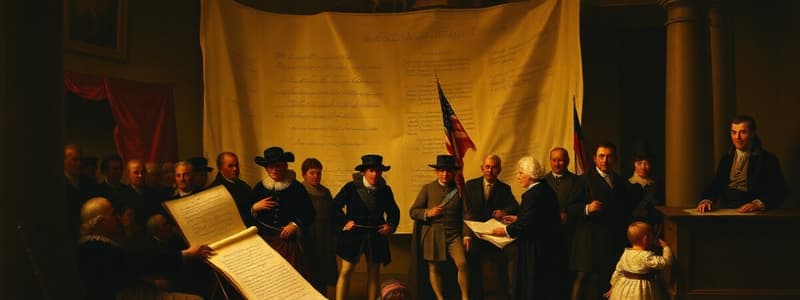Podcast
Questions and Answers
What was the purpose of the Proclamation of 1763?
What was the purpose of the Proclamation of 1763?
- To declare war on the French
- To protect American Indian lands from colonists (correct)
- To establish a new British colony
- To allow colonists to settle freely in the west
George III was the king during the American Revolutionary War.
George III was the king during the American Revolutionary War.
True (A)
Who proposed the Stamp Act?
Who proposed the Stamp Act?
George Grenville
The British government expanded the army in America to ________ men.
The British government expanded the army in America to ________ men.
Match the following actions with their consequences:
Match the following actions with their consequences:
What was the main reason colonists protested the Stamp Act?
What was the main reason colonists protested the Stamp Act?
The Quartering Act required colonists to provide food and housing only for soldiers stationed near their homes.
The Quartering Act required colonists to provide food and housing only for soldiers stationed near their homes.
What phrase did colonists use to express their disagreement with taxation without representation?
What phrase did colonists use to express their disagreement with taxation without representation?
The Sons of Liberty were known for their __________ tactics against tax collectors.
The Sons of Liberty were known for their __________ tactics against tax collectors.
Match the following acts with their descriptions:
Match the following acts with their descriptions:
Flashcards are hidden until you start studying
Study Notes
The Proclamation of 1763
- King George III issued the Proclamation of 1763 to prevent colonists from pushing westward into American Indian lands.
- The proclamation drew a line down the Appalachian Mountains, prohibiting settlement beyond it.
- Colonists protested, arguing that they had already claimed most of the land east of the Appalachians and needed to move west for more land.
- They saw the proclamation as an infringement on their rights and a sign of tyranny.
- The British government ignored these arguments and expanded the British army in America to 7,500 men to control the frontier.
The Stamp Act
- The British government sought to pay off the debt from the French and Indian War.
- To do so, Prime Minister George Grenville proposed the Stamp Act in 1765.
- The Stamp Act required colonists to buy stamps for all printed materials, including newspapers, licenses, and playing cards.
- The colonists again saw this as tyranny, as they had no representation in Parliament that passed the Act.
- They protested, arguing "No taxation without representation!"
- Loyalists refused to buy stamps, while Patriots engaged in more violent protests, including attacking tax collectors.
- Parliament repealed the Stamp Act after widespread protests.
The Quartering Act
- Although the Stamp Act was repealed, Parliament passed the Quartering Act in 1765.
- The Quartering Act compelled colonial assemblies to provide housing and supplies to British troops.
- Colonists protested, arguing the act was a form of taxation and that British troops were unnecessary and a drain on their resources.
- The New York assembly refused to fund supplies for troops, leading to increased tensions between colonists and the British government.
Studying That Suits You
Use AI to generate personalized quizzes and flashcards to suit your learning preferences.




